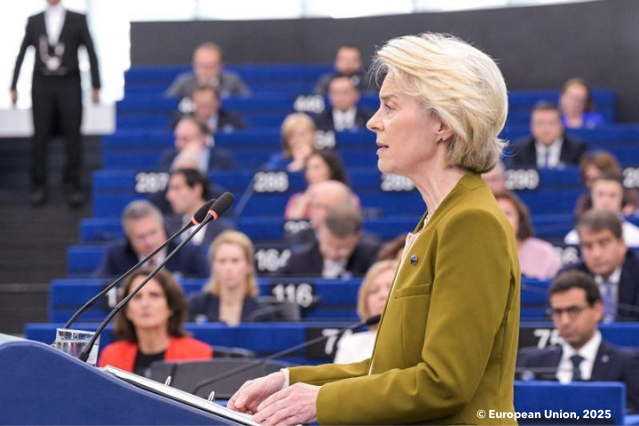
On 10 September, European Commission President Ursula von der Leyen delivered the first State of the European Union (SOTEU) speech of her second mandate. Against a fragile political backdrop of party divisions and growing global uncertainty, she called for unity, the strengthening of the EU’s competitiveness, enhanced security, and a more resilient Europe. She placed particular emphasis on the role of research and innovation in reinforcing the Union and on the importance of developing clean, homegrown energy technologies.
In this context, she pointed to massive investments in digital and clean technologies, as well as the proposed doubling of the Horizon Europe budget for 2028–2034, as key measures to reduce the EU’s dependencies on other economies and strengthen its competitiveness. Von der Leyen also highlighted the Union’s strong position in the clean energy transition, with low-carbon sources accounting for 70% of electricity, and presented the EU as a global leader in cleantech patents.
To further boost competitiveness, she committed to accelerating the implementation of the Clean Industrial Deal, including the forthcoming Industrial Accelerator Act, and to fostering lead markets where innovations are in demand, creating a virtuous cycle for EU industries and consumers.
Within cleantech, steel and batteries received particular focus. On batteries—identified as a critical enabler of other clean technologies—she announced a forthcoming €1.8 billion “Battery Booster Package” to expand European production. More broadly, she underlined the need to cut red tape for companies and proposed a “28th regime”, an EU-level legal framework for innovative firms to complement national regulations. In addition, a “Made in Europe” criterion was announced for promotion in public procurement.
While reiterating the intention to end dependence on Russian fossil fuels, von der Leyen also stressed the need to lower energy prices and expand domestic clean energy production. She highlighted the importance of modernising and investing in energy infrastructure, such as interconnectors, and announced the upcoming European Grid Package to accelerate permitting. Complementing this, she unveiled the “Energy Highways” initiative, designed to address eight bottlenecks in EU energy infrastructure by bringing together governments and utilities.
On climate, she reaffirmed the “power” of the Green Deal and the need to stay the course. Defending the proposed 90% emissions reduction target for 2040—criticised by far-right parties—she called for a clean transition that supports people and strengthens industry. She stressed the importance of climate resilience, adaptation, and nature-based solutions, and reiterated support for electric mobility, insisting that the future of the car industry is electric and should remain in Europe, despite growing political pressure to reverse the 2035 combustion engine ban.
Finally, von der Leyen addressed the transatlantic relationship, reaffirming the EU’s readiness to step up where the United States retreats. She cited research as a prime example, describing science as “one of the most valuable global goods”, and recalled the Choose Europe package, designed to attract and retain international scientists and researchers.